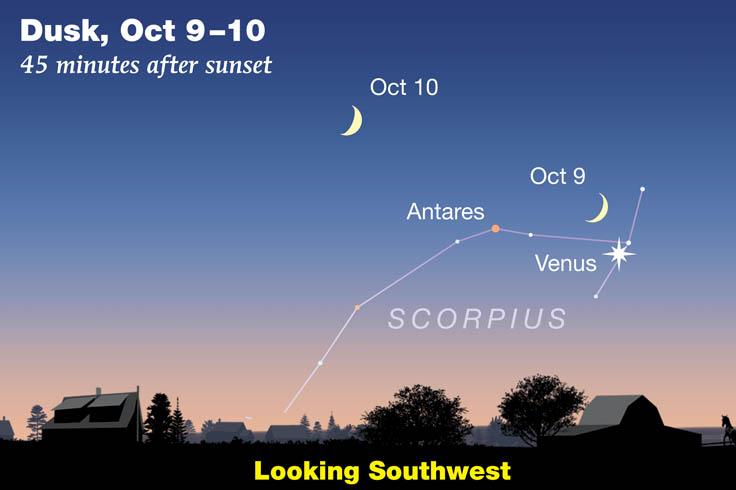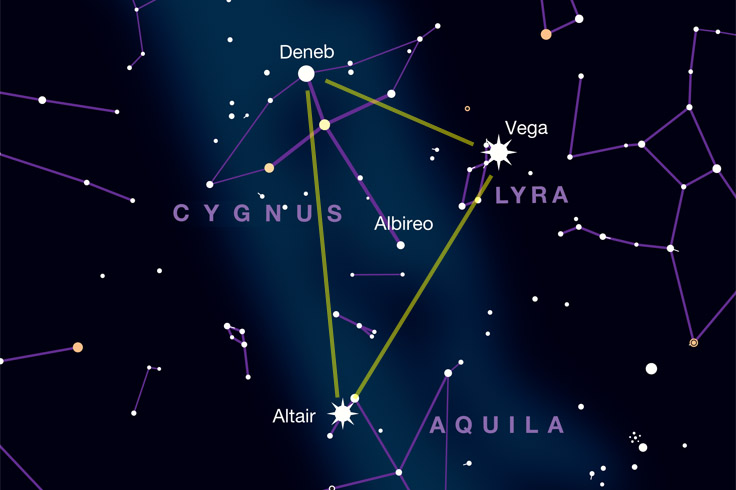Take advantage of October’s crisp, clear evenings and early-arriving dawns to explore the nighttime sky with our audio guided tour.

Listen Here:
Podcast: Play in new window | Download
Subscribe: Apple Podcasts | Google Podcasts | Spotify | Email | RSS | More
This month’s Sky Tour astronomy podcast guides to interesting sites in the starry sky — from Astronomy Day to Halloween . . . and much more.
October 9th is Astronomy Day, a worldwide celebration of all the wonderful sights that can be found in the night sky. (Check our event calendar and club listings to see if there’s a stargazing opportunity near you.)
Now it turns out that the evening sky has something special to offer on October 9th. Look low in the west, beginning about 30 minutes after sunset, and there you’ll behold a beautiful crescent Moon, just four days past new. Look closely at the Moon, and you might see “earthshine,” a ghostly glow on the part of the lunar disk that’s not lit by sunlight.

Sky & Telescope
October 9th’s crescent Moon is beautifully paired with the brilliant planet Venus. The two are separated by 3° or less, depending on where you live. But don’t wait too long to catch this pretty couple, because Venus isn’t very high up as twilight dims, and it sets about 2 hours after sunset.
After gazing at Venus low in the west, make a generous turn to the left. You’ll quickly pick up the bright beacon of Jupiter over the southern horizon. Jupiter is no match for the brilliance of Venus, but it is brighter than any star in the nighttime sky. After all, it’s the largest planet in our solar system, and it’s covered with bright clouds that reflect a lot of sunlight back in our direction. To Jupiter’s lower right, by a little more than the width of your clenched fist at arm’s length, is Saturn, the other gas giant in our planet family.
Now swing your gaze upward to overhead. You should see the three widely spaced stars of the Summer Triangle. The corner of the triangle farthest west, nearest the direction of sunset, is marked by Vega.Farther east and closer to Polaris is the star Deneb. The triangle’s third star is Altair, the head of a celestial eagle that’s winging toward the Swan. The correct pronunciation for this constellation might surprise you — listen to the podcast so you'll get it right!

Sky & Telescope
At month’s end, of course, is Halloween. When trick-or-treaters invade your neighborhood, set up a telescope so that all those little goblins and their parents can take a quick peek through the eyepiece. Start with Jupiter, then swing over to view Saturn and its famous rings. Then look overhead and point out the Summer Triangle.
And of course be sure to tell them about this month’s Sky Tour podcast! It’s perfect for anyone who wants a fun and informative guided tour of the celestial sights that are overhead during October.
 2
2
Comments
Mathieudelyon
October 7, 2021 at 1:21 am
I love the month of October because the moon is associated with the planet Venus, it's beautiful!
You must be logged in to post a comment.
misha17
October 17, 2021 at 9:29 am
Not related to this topic, but back in December, the author posted an article about the best meteor showers to expect in 2021 - https://skyandtelescope.org/observing/best-meteor-showers-in-2021/
The article mentioned a prediction from the International Meteor Sociiety that a couple of showers might be viewable from the Southern Hemisphere in late September and early October in the constellation Ara, fed by debris from comet Findlay.
I haven't seen any follow-up on the S&T website, but Spaceweather.com posted some articles confirming that the showers did indeed occur.
- Article on the Sept 27th shower, and alert for the Oct 6th/7th shower:
https://spaceweather.com/archive.php?view=1&day=06&month=10&year=2021
- Article on the Oct 7th shower:
https://spaceweather.com/archive.php?view=1&day=08&month=10&year=2021
You must be logged in to post a comment.
You must be logged in to post a comment.